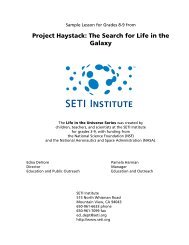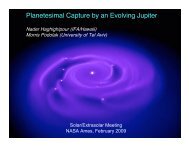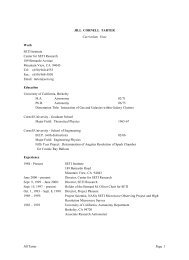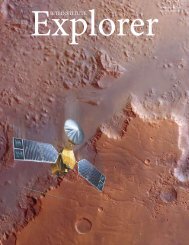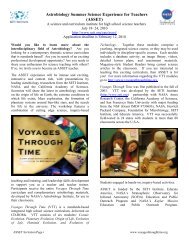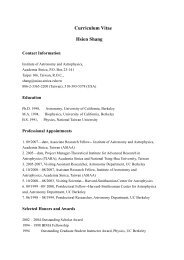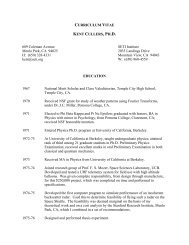Inside the Boardroom with Alan Bagley - SETI Institute
Inside the Boardroom with Alan Bagley - SETI Institute
Inside the Boardroom with Alan Bagley - SETI Institute
You also want an ePaper? Increase the reach of your titles
YUMPU automatically turns print PDFs into web optimized ePapers that Google loves.
Letter from <strong>the</strong> CEO<br />
July 2005<br />
Dear <strong>SETI</strong> <strong>Institute</strong> supporter,<br />
Previously, we introduced <strong>the</strong> world of extremophiles and <strong>the</strong>ir ability to survive<br />
<strong>the</strong> most intense of conditions. We now shift our focus to humankind’s key to<br />
survival: foresight.<br />
In this issue of Explorer, we examine a wide range of potential threats to Earth<br />
and consider what we might do to protect ourselves. Preparedness lies in <strong>the</strong><br />
willingness to face <strong>the</strong>se threats head on, educating ourselves now before <strong>the</strong> danger<br />
is imminent.<br />
Catastrophic changes to Earth’s environment 65 million years ago that led to <strong>the</strong><br />
extinction of <strong>the</strong> dinosaurs—often attributed to <strong>the</strong> impact of a massive asteroid on<br />
Mexico’s Yucatan Peninsula—also allowed for <strong>the</strong> rise of <strong>the</strong> mammals, eventually<br />
yielding humankind. Life on Earth is tenacious, always ready to take advantage<br />
of chance circumstances. The concept of 65 million years seems improbable to a<br />
society that prefers <strong>the</strong> speed of sound to <strong>the</strong> speed of evolution. As Louis Pasteur<br />
put it, “chance favors <strong>the</strong> prepared mind.” Preparing now through education and<br />
research is our insurance policy for <strong>the</strong> future.<br />
With warm regards,<br />
Tom Pierson<br />
Chief Executive Officer<br />
<strong>SETI</strong> <strong>Institute</strong> Mission Statement<br />
The mission of <strong>the</strong> <strong>SETI</strong> <strong>Institute</strong> is to explore, understand and explain <strong>the</strong> origin,<br />
nature and prevalence of life in <strong>the</strong> universe.<br />
On <strong>the</strong> Cover<br />
An artist’s rendering of an asteroid heading toward Earth.<br />
Image courtesy Seth Shostak<br />
From <strong>the</strong><br />
Science<br />
Editor’s Desk<br />
by Seth Shostak<br />
Two decades ago, I pitched what<br />
I thought was a great story to<br />
<strong>the</strong> science editor of a national<br />
magazine. I offered to describe<br />
<strong>the</strong> inevitable death of <strong>the</strong> universe.<br />
I got an angry rejection, <strong>with</strong> <strong>the</strong> complaint<br />
that <strong>the</strong> idea was both “dystopian<br />
and completely speculative.”<br />
Well, no argument <strong>with</strong> “dystopian.”<br />
But I took umbrage at “completely speculative.”<br />
Sure, many aspects of our planet’s<br />
future, and for that matter, <strong>the</strong> fate of <strong>the</strong><br />
We can’t reliably predict<br />
societal evolution, or<br />
even our own personal<br />
behavior next month.<br />
But physics is forever.<br />
universe, remain subject to chance (will<br />
Earth be flash-sterilized by a gamma ray<br />
burst) or poorly known (when, exactly, do<br />
all <strong>the</strong> protons disintegrate).<br />
But predicting <strong>the</strong> future of <strong>the</strong><br />
universe – even foretelling what will happen<br />
a trillion trillion trillion trillion trillion<br />
years from now and more – is not like trying<br />
to guess <strong>the</strong> stock market. It requires<br />
only a few astronomical observations and<br />
physics.<br />
We can’t reliably predict societal evolution,<br />
or even our own personal behavior<br />
next month. But physics is forever. Ten<br />
millennia from now, folks may not be<br />
greatly attuned to <strong>the</strong> art and music of<br />
<strong>the</strong> 19 th century, but <strong>the</strong>y will still expect<br />
<strong>the</strong>ir electronic devices to work. And those<br />
devices will be built on <strong>the</strong> basis of James<br />
Maxwell’s equations from <strong>the</strong> 1870s.<br />
Science is rewarding for a lot of reasons.<br />
It’s exciting and it’s challenging. Sure, being<br />
a tax consultant helps folks, and it pays<br />
<strong>the</strong> bills, too. But in <strong>the</strong> 101 st century, those<br />
tax forms will be archaeological dross, and<br />
not of much relevance. On <strong>the</strong> o<strong>the</strong>r hand,<br />
<strong>the</strong> discoveries of science will still be hanging<br />
in <strong>the</strong>re. They’ve got legs. After all,<br />
once we’ve uncovered one of nature’s secrets,<br />
her behavior is no longer “completely<br />
speculative.”<br />
Second Quarter 2005 - Celebrating our 20th Anniversary




